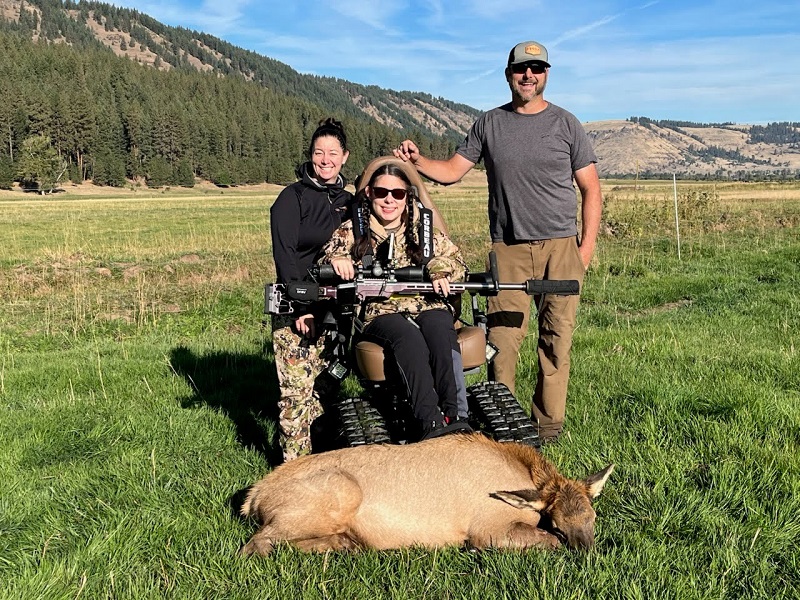
Empowering Hunters with Cerebral Palsy Through Innovative Adaptive Equipment
Taylor, a determined huntress, with the help of family and friends is preparing for her elk hunt in Oregon. She’s thrilled about her new adaptive rifle scope clip-on, designed to help people with limited mobility and low vision enjoy hunting more independently. Taylor has cerebral palsy, which makes it hard for her to steady herself enough to aim with a regular rifle scope. The Digital Crosshairs adaptive clip-on adds a targeting screen to any optical rifle scope, allowing the shooter to aim by simply looking at the screen. Adaptive gear like Digital Crosshairs can be a real game-changer for people with mobility and vision challenges, opening new for possibilities for disabled people in hunting and shooting sports. About the hunt:
Rifle: MOA Badrock 7PRC
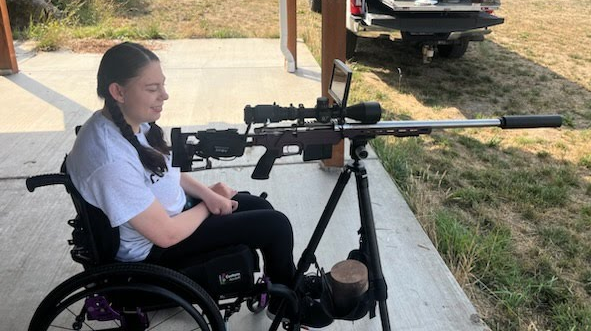
Scope: Night Force ATAC 5x25x56
Adaptive Equipment: Digital Crosshairs Adaptive Rifle Scope Clip-on
Ammunition: Hornady 175 ELD-X
Shot Distance: 200 yds
Hunt Location: Enterprise, Oregon
Hunt Date: Sunday, September 29, 2024, at 5:19 PM
Exploring the Benefits of Hunting for the Disabled
Hunting offers a unique set of benefits for disabled individuals, providing opportunities for physical activity, mental stimulation, and social connection. Adaptive hunters, including those with cerebral palsy, have found ways to participate in this time-honored tradition, overcoming challenges and reaping significant rewards. The benefits of hunting extend far beyond the thrill of the chase, encompassing various aspects of health and well-being.
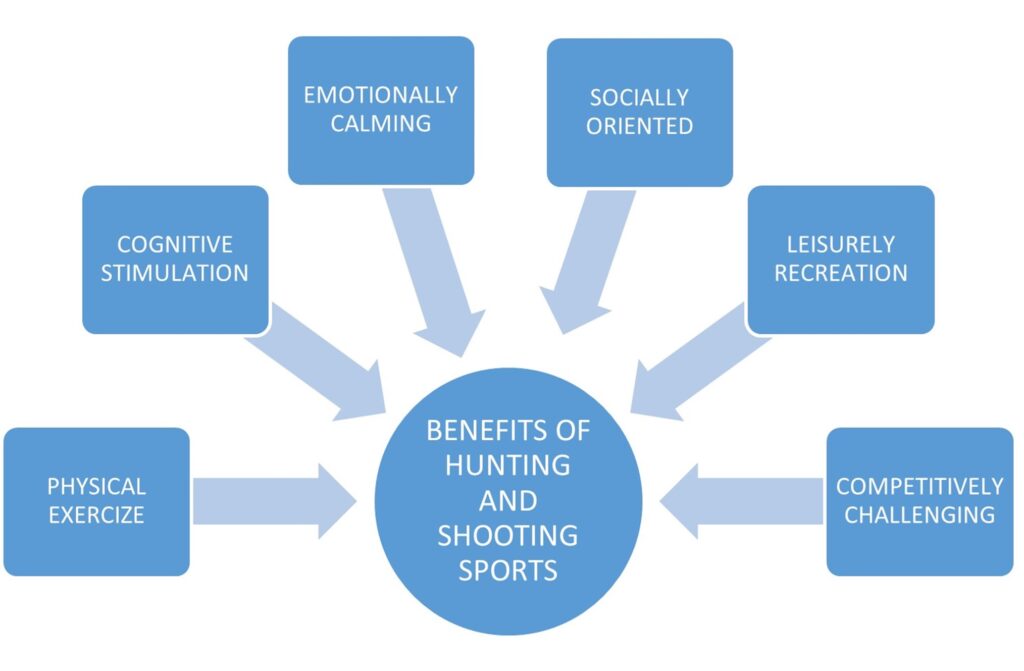
This article explores the advantages that hunting brings to disabled hunters. We’ll look at how it boosts physical health, enhances mental well-being, and fosters social and emotional growth. By examining these areas, we aim to shed light on why hunting has become a valuable pursuit for many individuals with disabilities, offering a path to empowerment and improved quality of life.
Physical Health Benefits
Hunting offers numerous physical health advantages for disabled individuals, providing opportunities for exercise and movement that might otherwise be challenging. Adaptive hunters, including those with cerebral palsy, can experience significant improvements in their overall physical well-being through this activity.
Improved Cardiovascular Health
Engaging in hunting activities has a positive impact on cardiovascular health of disabled people. The sport involves moderate-intensity aerobic exercise, which is beneficial for the heart and circulatory system. Hunters often walk long distances over uneven terrain while scouting for game, which easily fits into the category of cardiovascular exercise. This type of physical activity helps to strengthen the heart, improve blood circulation, and lower the risk of heart disease.
For disabled hunters, the use of adaptive equipment like all-terrain vehicles (ATVs) doesn’t diminish these benefits. As one adaptive hunter pointed out, “An ATV is, in fact, a disabled person’s legs when they’re using it.” This means that even with mobility aids, disabled hunters still engage in physical activity that boosts their cardiovascular health.
Increased Strength and Endurance
Hunting requires stamina and strength, which can be particularly beneficial for disabled individuals. The various tasks involved in hunting, such as walking, bending, stretching, and hauling, contribute to building strength and endurance. Upper-body strength, in particular, has been identified as a crucial factor for successful hunting.
Research has shown that upper-body strength is the strongest and most consistent predictor of men’s hunting reputation. This suggests that engaging in hunting activities can lead to improvements in upper-body strength for disabled hunters. Some hunters have reported gains in strength and muscle mass after incorporating simple strength training into their routines to prepare for hunting seasons.
The physical demands of hunting extend beyond the actual hunt. Many hunters process and package their own game, which can take several days to complete. This additional physical activity further contributes to building strength and endurance.
Enhanced Balance and Coordination
Hunting presents unique challenges that can help improve balance and coordination for disabled individuals. Navigating through woods and shorelines, maintaining stability in a tree stand, and handling hunting equipment all require a high degree of balance and coordination.
For individuals with disabilities, these challenges can serve as a form of adaptive physical activity. Such activities have been shown to improve static and dynamic stability in older adults and individuals with various disabilities. The combination of dual-task, function-oriented challenges while controlling balance stimulates the sensory and neuromuscular control mechanisms.
Moreover, hunting often involves activities that challenge the sensory, cognitive, and musculoskeletal systems. This multifaceted approach to physical activity can lead to improvements in balance control during activities of daily living (ADL).
The physical health benefits of hunting extend beyond the immediate effects. Regular participation in hunting activities can contribute to long-term improvements in physical function, potentially preventing or delaying frailty in individuals with disabilities. The combination of aerobic activity, strength-building exercises, and balance challenges provided by hunting can help maintain functional independence and improve overall quality of life.
It’s important to note that the physical benefits of hunting are not limited to the hunt itself. The preparation for hunting seasons, including scouting trips and equipment maintenance, also contributes to increased physical activity. This year-round engagement in hunting-related activities can help disabled individuals maintain a consistent level of physical activity, leading to sustained health benefits.
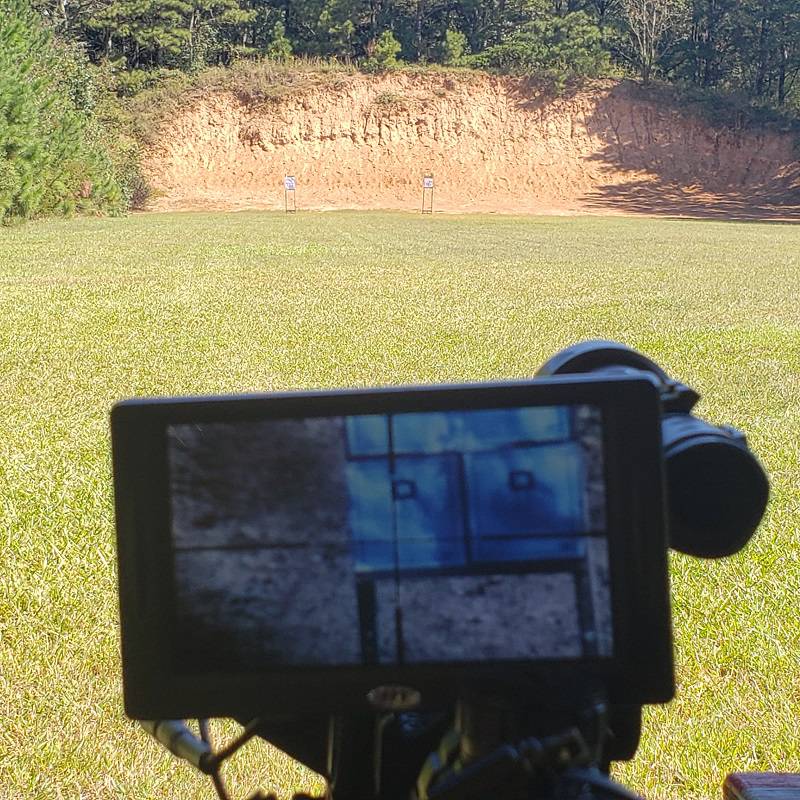
Mental Health Advantages
Hunting offers significant mental health benefits for disabled individuals, providing a unique opportunity to enhance psychological well-being. These advantages extend beyond the physical aspects of the activity, contributing to overall mental wellness and personal growth.
Stress Reduction
Engaging in hunting activities has a positive impact on stress levels for disabled hunters. The outdoor environment and connection with nature serve as natural stress relievers. Being in the woods, waiting for the sun to rise or game to appear, offers a chance to quiet the mind and reflect. This experience closely mimics other therapeutic forms known to help relieve anxiety and symptoms of post-traumatic stress disorder (PTSD).
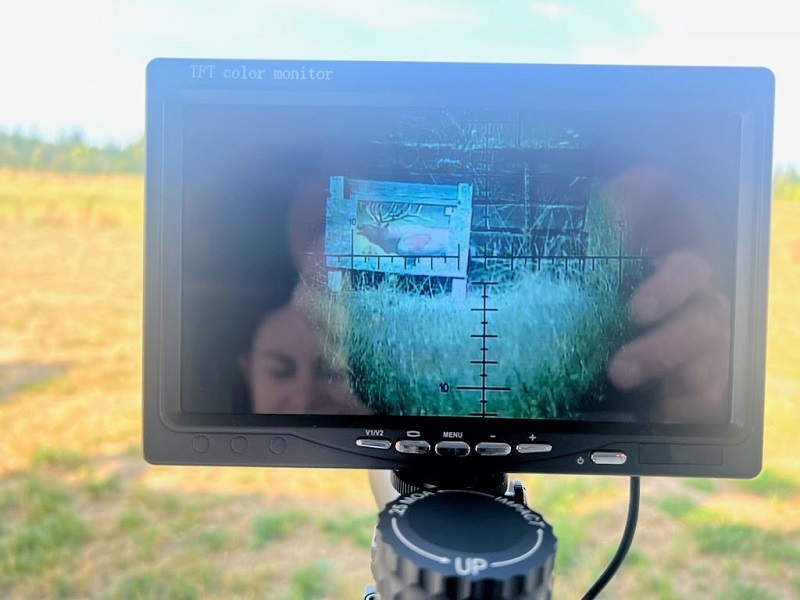
The act of hunting itself can be meditative, allowing individuals to focus on the present moment and temporarily set aside daily worries. Many disabled hunters report feeling a sense of calm and relaxation while in nature, which has a positive effect on their overall stress levels. The combination of fresh air, natural surroundings, and the challenge of the hunt provides a unique form of stress relief that is difficult to replicate in other settings.
Boosted Self-Esteem
Participating in hunting activities can significantly boost self-esteem for disabled individuals. The challenges presented by hunting, such as navigating difficult terrain or successfully tracking game, provide opportunities for personal growth and achievement. Overcoming these obstacles can lead to a sense of accomplishment and increased confidence in one’s abilities.
Adaptive hunters often develop innovative solutions to participate in hunting activities, which can further enhance their self-esteem. By finding ways to adapt equipment or techniques to suit their specific needs, disabled hunters demonstrate resilience and problem-solving skills. This adaptability not only allows them to participate in hunting but also reinforces their sense of capability and independence.
Success in hunting, whether it’s tracking an animal or making a clean shot, can be a powerful confidence booster. Even when hunts are unsuccessful, the experience of being in nature and facing challenges head-on contributes to personal growth. As one hunter noted, “Present failures will contribute to future successes.” This mindset helps build resilience and a positive self-image, regardless of the hunt’s outcome.
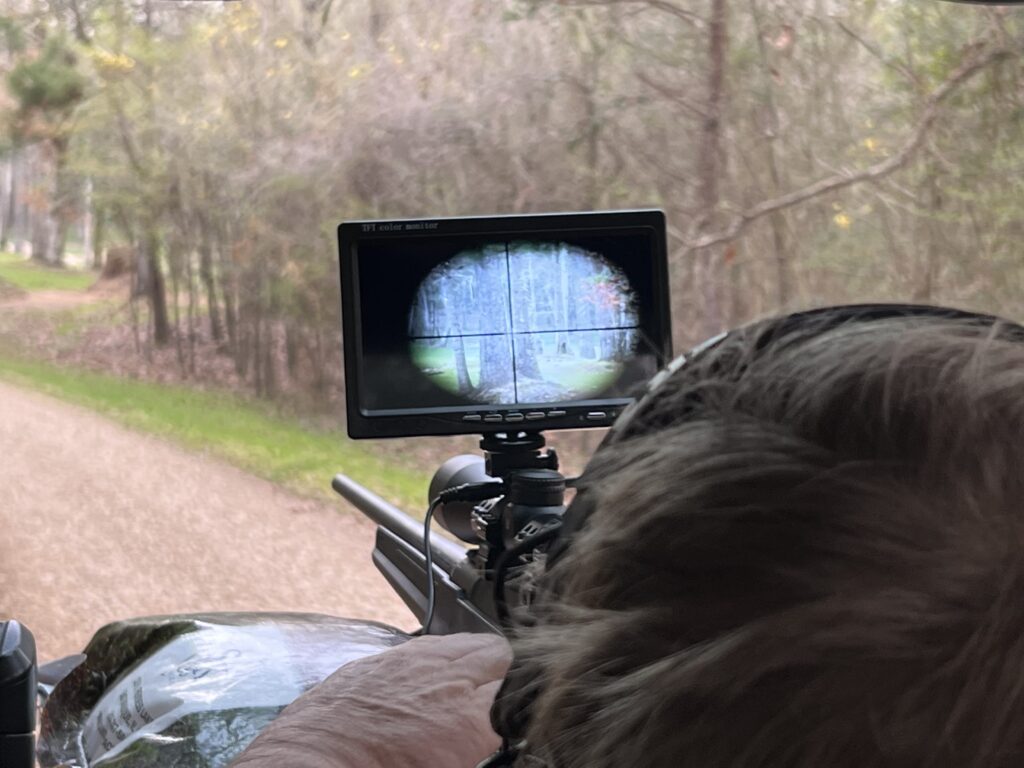
Improved Focus and Concentration
Hunting requires a high level of focus and concentration, which can have lasting benefits for disabled individuals. The need to remain alert and attentive while waiting for game or tracking animals helps develop and strengthen these cognitive skills. This improved ability to focus can translate to other areas of life, enhancing overall cognitive function.
For individuals with learning disabilities or attention challenges, hunting provides a unique opportunity to practice sustained concentration. The natural environment, free from many everyday distractions, creates an ideal setting for developing these skills. The act of aiming and shooting also demands intense focus, further honing concentration abilities.
Moreover, the preparation involved in hunting, such as studying animal behavior and planning strategies, engages problem-solving skills and critical thinking. This mental engagement can help improve overall cognitive function and may even have positive effects on memory and attention span.
The mental health advantages of hunting for disabled individuals are multifaceted and significant. From reducing stress and boosting self-esteem to improving focus and concentration, hunting offers a unique combination of benefits that contribute to overall psychological well-being. By providing opportunities for personal growth, achievement, and connection with nature, hunting has become a valuable therapeutic activity for many disabled individuals, enhancing their quality of life and mental resilience.
Social and Emotional Benefits
Hunting offers significant social and emotional advantages for disabled individuals, providing opportunities for personal growth, connection, and empowerment. These benefits extend beyond the physical aspects of the activity, contributing to overall well-being and quality of life.
Building Relationships
Hunting serves as a powerful tool for building relationships and fostering a sense of community among disabled hunters. Organizations like Capable Partners in Minnesota have been bringing together hunters with disabilities for over two decades, creating a supportive network that connects people with the great outdoors. These group hunts provide ideal opportunities for disabled hunters to meet others who share their passion and face similar challenges.
The social aspect of hunting goes beyond the actual hunt itself. Many disabled hunters report forming lasting friendships with fellow hunters, volunteers, and guides. These connections often extend beyond the hunting season, creating a supportive community that understands the unique challenges and triumphs of adaptive hunting.
Hunting also enhances relationships with family and friends. For many disabled individuals, the opportunity to participate in hunting activities allows them to reconnect with loved ones who share this interest. It provides a common ground for bonding and creating shared experiences, strengthening family ties and friendships.
Sense of Accomplishment
Participating in hunting activities can lead to a profound sense of accomplishment for disabled hunters. Many report feeling empowered and confident after successfully navigating the challenges of a hunt. This feeling of achievement is often evident in the smiles on their faces and the stories they share after a hunting experience.
For some disabled hunters, the sense of accomplishment comes from harvesting an animal. However, many find fulfillment in simply being out in nature and connecting with the environment. As one hunter noted, “I don’t need to take an animal to enjoy the hunt. I just like the opportunity to be out there and connect with nature.”
The use of adaptive equipment and innovative solutions to overcome physical limitations further contributes to this sense of accomplishment. For example, some hunters with mobility issues have used specialized machines that attach to guns, allowing them to aim and shoot independently. This independence in hunting has a positive impact on self-esteem and personal growth.
Overcoming Challenges
Hunting presents unique challenges for disabled individuals, but overcoming these obstacles has a positive impact on their emotional well-being. Many disabled hunters report that the process of adapting to their physical limitations and finding ways to participate in hunting has been a transformative experience.
Organizations and volunteers play a crucial role in helping disabled hunters overcome challenges. They provide adaptive equipment, accessible hunting locations, and personalized support to ensure that hunters can participate fully in the experience. This support network helps disabled hunters feel welcome, confident, and in tune with the natural spaces around them.
The process of overcoming challenges in hunting often translates to other areas of life. Many disabled hunters report feeling more confident in tackling everyday obstacles after successfully navigating the complexities of a hunt. This increased resilience and problem-solving ability has a positive impact on overall emotional well-being.
Moreover, the outdoor experience itself can be therapeutic for many disabled hunters. Being in nature, away from the constraints of daily life, provides an opportunity for reflection and personal growth. Many find that the challenges of hunting help them gain a new perspective on their abilities and limitations, leading to increased self-acceptance and emotional resilience.
In conclusion, the social and emotional benefits of hunting for disabled individuals are substantial. From building meaningful relationships and fostering a sense of community to achieving a sense of accomplishment and overcoming challenges, hunting provides a unique platform for personal growth and emotional well-being. These benefits extend far beyond the hunt itself, contributing to improved quality of life and a stronger sense of self for many disabled hunters.
Conclusion
Hunting has a profound influence on the lives of disabled individuals, offering a unique blend of physical, mental, and social benefits. The opportunity to connect with nature, overcome challenges, and build relationships contributes to improved health and well-being. This activity not only helps to boost physical strength and cardiovascular health but also plays a crucial role in reducing stress and enhancing self-esteem.
To wrap up, the advantages of hunting extend far beyond the thrill of the chase for disabled individuals. It provides a platform to grow personally, foster independence, and find a sense of belonging within a supportive community. As adaptive hunting continues to evolve, it opens up new possibilities for disabled individuals to enjoy the outdoors and reap the many rewards this time-honored tradition has to offer.